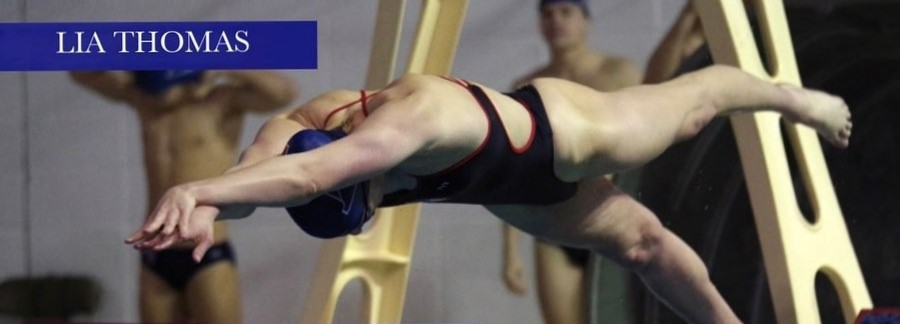Transgender swimmer under fire for smashing records
D1 athlete Lia Thomas sparks debate over NCAA rules after crushing her opponents
University of Pennsylvania swimmer Lia Thomas has recently become the center of a massive controversy over her newest record-breaking swim times during a recent swim meet. Thomas had managed to dominate the pool in multiple races at the Ohio Zippy Invitational, one of which was the 1,650 freestyle, with the record time of 15:59.71. Anna Kalandadze, Thomas’s teammate, finished second, almost 38 seconds behind.
What exactly caused such a cold reception to her performance? The Penn athlete is transgender.
Since the Ohio meet, Thomas’s scores have been met with outrage and frustration. Although Thomas has broken no rules, many see the scores as an affront to womens sports. Even a number of Thomas’s own teammates admitted to considering a boycott over her scores.
The NCAA rules state that transgender women can participate in any given sport if they have taken testosterone blockers and hormone replacement treatment for at least 365 days.
Lia Thomas started her swimming career at Penn as male for three years, but in the fall of 2019, came out as transgender to her teammates on the mens team. She began her hormone treatment in May the same year, and has been using testosterone suppressants since then. According to NCAA guidelines, Lia Thomas is adhering to the rules and is allowed to represent the women’s team at her university.

Since the beginning of her transition, Thomas has seen all of her best times dramatically decrease, with her 1650 freestyle dropping 95 seconds since her time on the men’s team. The numbers make it clear that 365 days with Hormone Replacement Therapy had a large effect.
Yet, people are still not satisfied.
The controversy began when a teammate anonymously spoke out against Thomas in an interview with the swimming magazine Outkick, stating that going through male puberty gives her an unfair advantage over the rest of the team and any competition.
“One year [of hormone blockers] doesn’t mean anything. What about years of puberty as a male, the male growth you went through as a man?” the anonymous teammate asked in the interview.
“I know no matter what, biological women will never be on an equal playing field with transgender [women],” said a second teammate who spoke with Outkick.
These interviews have sparked endless debate of whether or not transgender women deserve to be playing on the same team as other women. Cynthia Millen made her opinions clear when she publically resigned from her position as a USA swimming officiator.
“I told my fellow officials that I can no longer participate in a sport that allows biological [males] to compete against women,” she said. “Everything fair about swimming is being destroyed.”
Many, however, stand in solidarity with Thomas as she is put under the spotlight. Schuyler Bailar, the first openly transgender NCAA D1 swimmer, recently jumped to her defence.
“Lia is not a great athlete because she was [assigned male at birth]. Lia is a great athlete because she is a great athlete and has worked hard for 17 years to be great at something she loves,” he wrote in an instagram post.
Bailar also brought up the idea that diversity exists across all demographics.
“When this exists within [cisgendered] men, people usually praise and celebrate the diversity. But those who defy white, [cisgendered] heteranormative standards are often accused of being ‘unfair,’’ he states in the same post.
The NCAA guidelines also raise this point up.
“It is important not to overgeneralize. The assumption that all male-bodied people are taller, stronger, and more highly skilled in a sport than all female-bodied people is not accurate,” it reads.
“Transgender women display a great deal of physical variation, just as there is a great deal of natural variation in physical size and ability among non-transgender women and men. Many people may have a stereotype that all transgender women are unusually tall and have large bones and muscles. But that is not true.”
The text goes on to say that the argument that all transgender women will, without a doubt, be stronger, faster, and better than any cisgendered woman assumes three things:.
“One, that transgender women are not ‘real’ women and therefore not deserving of an equal competitive opportunity; two, that being born with a male body automatically gives a transgender woman an unfair advantage when competing against non-transgender women; and three, that men might be tempted to pretend to be transgender in order to compete in competition with women. These assumptions are not well founded.”
Thomas’ supporters point out that while her wins are called into question, critics ignore her losses. In a Jan. 8 meet, for instance, Thomas snagged 2 victories, but also lost 2 races. In fact, Thomas placed behind three cisgender women.
Karleigh Webb, a sports journalist for Outsports and a fellow transgender athlete, gave her opinion on the critics’ arguments.
“A transgender woman can play against cisgender women as long as the transgender woman always loses,” she wrote in an article.






































